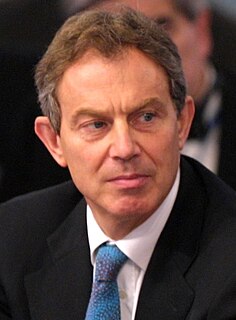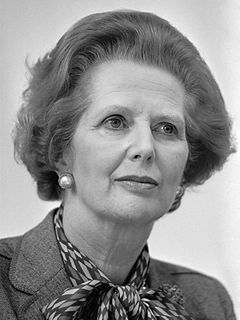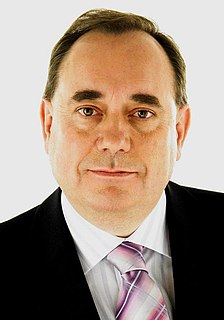
The United Kingdom is a unitary state with devolution that is governed within the framework of a parliamentary democracy under a constitutional monarchy in which the monarch, currently Queen Elizabeth II, is the head of state while the Prime Minister of the United Kingdom, currently Boris Johnson, is the head of government. Executive power is exercised by the British government, on behalf of and by the consent of the monarch, and the devolved governments of Scotland and Wales and the Northern Ireland Executive. Legislative power is vested in the two chambers of the Parliament of the United Kingdom, the House of Commons and the House of Lords, as well as in the Scottish Parliament and Welsh and Northern Ireland assemblies. The judiciary is independent of the executive and the legislature. The highest court is the Supreme Court of the United Kingdom.

The 1997 United Kingdom general election is a national election that was held on 1 May 1997. The governing Conservative Party sought to protect their majority in the House of Commons against their opposition, the Labour Party, following the general election of 1992. Incumbent Prime Minister John Major called for the election in March 1997 to allow for six weeks of campaigning, and appointed polling day to coincide with local elections that year.

The 1983 United Kingdom general election was held on Thursday 9 June 1983. It gave the Conservative Party under the leadership of Margaret Thatcher the most decisive election victory since that of the Labour Party in 1945.
Scotland is a country which is in a political union with the rest of the United Kingdom. Having been directly governed by the UK Government since 1707, a system of devolution was established in 1999, after the Scottish people voted by a firm majority to re-establish a primary law making Scottish Parliament in a referendum held in 1997.

The October 1974 United Kingdom general election took place on Thursday 10 October 1974 to elect 635 members of the British House of Commons. It was the second general election held that year, the first year that two general elections were held in the same year since 1910, and the first time that two general elections were held less than a year apart from each other since the 1923 and 1924 elections, which took place 10 months apart. The election resulted in the Labour Party led by Harold Wilson winning the narrowest majority recorded, 3 seats. This enabled the remainder of the Labour government, 1974–1979 to take place, which saw a gradual loss of its majority.

The 2003 Scottish Parliament election, was the second election of members to the Scottish Parliament. It was held on 1 May 2003 and it brought no change in terms of control of the Scottish Executive. Jack McConnell, the Labour Party Member of the Scottish Parliament (MSP), remained in office as First Minister and the Executive continued as a Labour and Liberal Democrat coalition. As of 2019, it remains the last general election victory for the Scottish Labour Party.

The first election to the devolved Scottish Parliament, to fill 129 seats, took place on 6 May 1999. Following the election, the Labour Party and the Liberal Democrats formed the Scottish Executive, with Labour Member of the Scottish Parliament (MSP) Donald Dewar becoming First Minister.
The Unionist Party was the main centre-right political party in Scotland between 1912 and 1965.

The 1959 United Kingdom general election was held on Thursday, 8 October 1959. It marked a third consecutive victory for the ruling Conservative Party, now led by Harold Macmillan. For the second time in a row, the Conservatives increased their overall majority in Parliament, this time to 100 seats, having gained 20 seats for a return of 365. The Labour Party, led by Hugh Gaitskell, lost 19 seats and returned 258. The Liberal Party, led by Jo Grimond, again returned only six MPs to the House of Commons, but managed to increase its overall share of the vote to 5.9%, compared to just 2.7% four years earlier. Despite their success, the Conservatives failed to win the most seats in Scotland and have not done so since. The election marked the beginning of Labour's domination of Scottish seats at Westminster, which lasted until the rise of the Scottish National Party at the 2015 general election. Both Jeremy Thorpe, a future Liberal leader, and Margaret Thatcher, a future Conservative leader and eventually Prime Minister, first entered the House of Commons after this election.

The Scottish Labour Party (SLP), also known as the Scottish Parliamentary Labour Party, was formed by Robert Bontine Cunninghame Graham, the first socialist MP in the Parliament of the United Kingdom, who later went on to become the first president of the Scottish National Party, and Keir Hardie, who later became the first leader of the Independent Labour Party.

The 2005 United Kingdom general election was held on Thursday 5 May 2005, to elect 646 members to the House of Commons. The Labour Party, led by Tony Blair, won its third consecutive victory, with Blair becoming the only Labour leader beside Harold Wilson to form three majority governments. However, its majority fell to 66 seats compared to the 167-seat majority it had won four years before. As of 2020, it remains the last general election victory for the Labour Party and was also the last general election until 2019 that a single political party would manage to achieve a large overall majority over all other parties.
The Scottish Labour Party is the UK Labour Party's devolved Scotland administrative subdivision.

The 2011 Scottish Parliament election was held on Thursday, 5 May 2011 to elect 129 members to the Scottish Parliament.

The 2007 Scottish Parliament election was held on Thursday 3 May 2007 to elect members to the Scottish Parliament. It was the third general election to the devolved Scottish Parliament since it was created in 1999. Local elections in Scotland fell on the same day.
The Labour Party is a centre-left political party in the United Kingdom that has been described as an alliance of social democrats, democratic socialists and trade unionists. In all general elections since 1922, Labour has either been the governing party or the Official Opposition.

2003 Elections to Fife Council were held on 3 May 2003, the same day as the other Scottish local government elections and the Scottish Parliament election. The election was the last one to use plurality system of election to elected the 78 individual councillors.
Socialism in the United Kingdom is thought to stretch back to the 19th century from roots arising in the aftermath of the English Civil War. Notions of socialism in Great Britain have taken many different forms from the utopian philanthropism of Robert Owen through to the reformist electoral project enshrined in the birth of the Labour Party.

The 2015 United Kingdom general election was held on Thursday, 7 May 2015 to elect 650 members to the House of Commons. It was the first general election at the end of a fixed-term Parliament. Local elections took place in most areas on the same day.

The 2019 United Kingdom general election was held on Thursday 12 December 2019. The Conservative Party, having failed to obtain a majority in the 2017 general election, had faced prolonged parliamentary deadlock over Brexit while it governed in minority with the support of the Democratic Unionist Party (DUP), a situation which had forced the resignation of the previous Prime Minister Theresa May. As a result, Boris Johnson called for an early election to take place in December; legislation to achieve this was eventually approved.













